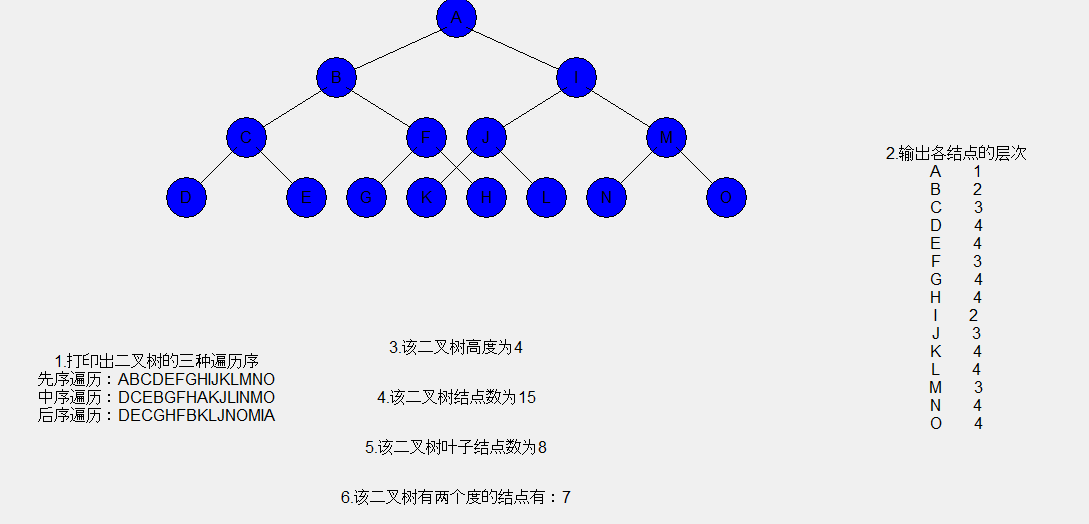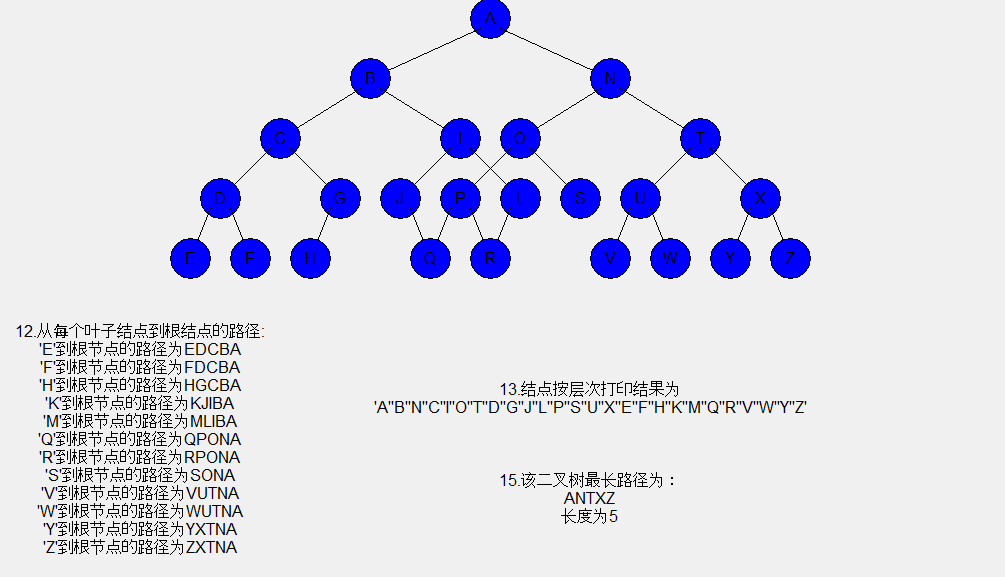python实战--数据结构二叉树
此文将讲述如何用python实战解决二叉树实验
前面已经讲述了python语言的基本用法,现在让我们实战一下具体明确python的用法
点击我进入python速成笔记
先看一下最终效果图:

首先我们要定义二叉树结点的一个类,在python中定义二叉树结点代码如下:
#二叉链表
class BiTree:
def __init__(self, elementType=None, lchild=None, rchild=None):
self.elementType = elementType
self.lchild = lchild
self.rchild = rchild
其次初始化二叉树头结点的代码如下:
#初始化二叉树新建头结点
def initTree(s):
temp=BiTree()
ptree=BiTree("A",temp,temp)
if s[2]==0:
ptree.lchild=None
if s[4]==0:
ptree.rchild=None
return ptree,temp
二叉树中经常需要访问子节点,那么子节点的代码:
#寻找下一个结点
def getNext(tree,temp):
if(tree.lchild ==temp ):
return tree
if (tree.lchild!=None):
if(getNext(tree.lchild,temp)!=None):
return getNext(tree.lchild,temp)
if (tree.rchild==temp):
return tree
if(tree.rchild !=None):
if (getNext(tree.rchild,temp) != None):
return getNext(tree.rchild,temp)
return None
有了头结点也能找到子节点,那么绘图二叉树的代码如下:
绘图需要传入图形窗口对象,根节点,初始根节点x,y坐标以及深度1
#画出二叉树图
def drawroot(graph,root,x,y,deep):
# 画椭圆
oval = Oval(Point(x-20, y-20), Point(x+20, y+20))
oval.setFill('blue') # 填充颜色
oval.draw(graph)
# 显示文字
message = Text(Point(x, y), root.elementType)
message.draw(graph)
if(root.lchild!=None):
# 画线
line = Line(Point(x - 10, y + 10), Point(x - 30*deep, y + 60))
line.draw(graph)
drawroot(graph,root.lchild,x-30*deep,y+60,deep-1)
if(root.rchild!=None):
# 画线
line = Line(Point(x+10, y + 10), Point(x + 30*deep, y + 60))
line.draw(graph)
drawroot(graph, root.rchild, x + 30*deep, y + 60,deep-1)
如何快速生成二叉树需要动用文件,根据文件链接子树代码:
读入根节点和一个临时结点,根节点名字和是否有左右子树开始链接
#根据文件建立二叉链表
def getTree(tree,temp,name,left,right):
child=BiTree(name,temp,temp)
if(not left):
child.lchild=None
if(not right):
child.rchild=None
if(tree.lchild==temp):
tree.lchild=child
elif(tree.rchild==temp):
tree.rchild=child
具体完整读取代码完全链接子树代码如下:
input = open('bt31.txt', 'r')
s = []
try:
for line in input:
s.append(line)
finally:
input.close()
ptree, temp = initTree(s[0])
for i in range(len(s)):
if i != 0:
getTree(getNext(ptree, temp), temp, s[i][0], eval(s[i][2]), eval(s[i][4]))
然后生成图形窗口绘制上面二叉树代码为:
gragh = GraphWin('CSSA', 1200, 700)
drawroot(gragh, ptree, 500, 20, 4)
效果如下:

以上便是二叉树生成的前提操作,后面代码即为数据结构实验五二叉树1-10题必做题源代码以及12,13,15选做题源码:
#三种二叉遍历
def DLR(tree):
order=[]
if(tree!=None):
order.append(tree.elementType)
if(tree.lchild!=None):
order=order+DLR(tree.lchild)
if(tree.rchild!=None):
order=order+DLR(tree.rchild)
return order
def LDR(tree):
order=[]
if (tree != None):
if (tree.lchild != None):
order = order + LDR(tree.lchild)
order.append(tree.elementType)
if (tree.rchild != None):
order = order + LDR(tree.rchild)
return order
def LRD(tree):
order=[]
if (tree != None):
if (tree.lchild != None):
order = order + LRD(tree.lchild)
if (tree.rchild != None):
order = order + LRD(tree.rchild)
order.append(tree.elementType)
return order
#打印题目一信息
def exp1(gragh,ptree):
str=""
str += "先序遍历:"
for i in range(len(DLR(ptree))):
str+=DLR(ptree)[i]
str +="\n"
str += "中序遍历:"
for i in range(len(LDR(ptree))):
str +=LDR(ptree)[i]
str +="\n"
str += "后序遍历:"
for i in range(len(LRD(ptree))):
str +=LRD(ptree)[i]
str +="\n"
message = Text(Point(200, 400), "1.打印出二叉树的三种遍历序\n"+str)
message.draw(gragh)
#遍历结点层次
def DLRDeep(tree,deep):
order=""
if(tree!=None):
order=order+tree.elementType+" "+repr(deep)+"\n"
if(tree.lchild!=None):
order=order+DLRDeep(tree.lchild,deep+1)
if(tree.rchild!=None):
order=order+DLRDeep(tree.rchild,deep+1)
return order
def exp2(gragh,ptree):
str=DLRDeep(ptree,1)
message = Text(Point(1000, 300), "2.输出各结点的层次\n"+str)
message.draw(gragh)
#查找树的高度
def height(tree):
h=0
if(tree!=None):
left=height(tree.lchild)
right=height(tree.rchild)
if(left>right):
h=left+1
else :
h=right+1
return h
def exp3(gragh,ptree):
str="3.该二叉树高度为"+repr(height(ptree))
message = Text(Point(500, 350), str)
message.draw(gragh)
#查询结点数量
def getnum(tree):
num=0
if(tree!=None):
num=num+1
num+=getnum(tree.lchild)
num+=getnum(tree.rchild)
return num
def exp4(gragh,ptree):
str="4.该二叉树结点数为"+repr(getnum(ptree))
message = Text(Point(500, 400), str)
message.draw(gragh)
#查询叶子结点数量
def getleaf(tree):
num=0
if(tree!=None):
num+=getleaf(tree.lchild)
num+=getleaf(tree.rchild)
if(tree.lchild==None and tree.rchild==None):
return 1
return num
def exp5(gragh,ptree):
str="5.该二叉树叶子结点数为"+repr(getleaf(ptree))
message = Text(Point(500, 450), str)
message.draw(gragh)
#查询两个度的结点数量
def getTwo(tree):
num=0
if(tree!=None):
num+=getTwo(tree.lchild)
num+=getTwo(tree.rchild)
if(tree.lchild!=None and tree.rchild!=None):
num+=1
return num
def exp6(gragh,ptree):
str="6.该二叉树有两个度的结点有:"+repr(getTwo(ptree))
message = Text(Point(500, 500), str)
message.draw(gragh)
#查询父亲结点,兄弟结点,子节点
def findFather(tree,name):
if(tree!=None):
if(tree.lchild!=None and tree.lchild.elementType==name):
return tree
if(tree.rchild!=None and tree.rchild.elementType==name):
return tree
if findFather(tree.rchild,name)!=None:
return findFather(tree.rchild,name)
if findFather(tree.lchild,name)!=None:
return findFather(tree.lchild,name)
return None
def info(tree,name):
father=findFather(tree,name)
if(father.lchild!=None and father.lchild.elementType==name):
brother=father.rchild
son1=father.lchild.lchild
son2=father.lchild.rchild
else :
brother=father.lchild
son1=father.rchild.lchild
son2=father.rchild.rchild
return father,brother,son1,son2
def exp7(gragh ,tree,name):
str=""
father,brother,son1,son2=info(tree,name)
if(father==None):
str+="8.父节点不存在"+"\n"
else:
str+="8.父节点为:"+repr(father.elementType)+"\n"
if(brother==None):
str+="兄弟结点不存在"+"\n"
else:
str+="兄弟结点为:"+repr(brother.elementType)+"\n"
if(son1==None):
str+="左子结点不存在"+"\n"
else:
str+="左子结点为:"+repr(son1.elementType)+"\n"
if (son1 == None):
str += "右子结点不存在"+"\n"
else:
str+="右子结点为:"+repr(son2.elementType)+"\n"
message = Text(Point(400, 550), str)
message.draw(gragh)
#查询指定结点深度
def getdeep(tree,name,deep): #EXP8
if (tree != None):
if (tree.elementType==name):
return deep
deepleft=getdeep(tree.lchild,name,deep+1)
deepright=getdeep(tree.rchild,name,deep+1)
if(deepleft!=0):
return deepleft
if(deepright!=0):
return deepright
return 0
def exp8(gragh,tree,name):
deep=getdeep(tree,name,1)
if(deep==0):
message = Text(Point(400, 500), "7.本结点不存在")
message.draw(gragh)
return 0
else:
message = Text(Point(400, 500), "7.本结点:"+repr(name)+"深度为"+repr(deep))
message.draw(gragh)
return 1
#顺序存储变为二叉链表存储
def seqToNode(s,tree,i):
if(tree!=None):
if(i*2>len(s)):
tree.lchild=None
elif (s[i*2]==None) :
tree.lchild=None
else:
temp = BiTree(s[i*2])
tree.lchild=temp
if(i*2+1>len(s)):
tree.rchild=None
elif (s[i*2+1]==None):
tree.rchild=None
else:
temp = BiTree(s[i*2 + 1])
tree.rchild=temp
seqToNode(s,tree.lchild,i*2)
seqToNode(s,tree.rchild,i*2+1)
#交换左右二叉树
def change(tree):# EXP10
if(tree!=None):
temp=tree.lchild
tree.lchild=tree.rchild
tree.rchild=temp
if(tree.lchild!=None):
change(tree.lchild)
if(tree.rchild!=None):
change(tree.rchild)
#找所有结点的路径
def road(s,tree,all):
if(tree.rchild==None and tree.lchild==None):
all.append(repr(tree.elementType))
all.append("到根节点的路径为"+reverse1(s)+"A"+"\n")
if(tree.lchild!=None):
road(s+tree.lchild.elementType,tree.lchild,all)
if(tree.rchild!=None):
road(s+(tree.rchild.elementType),tree.rchild,all)
def exp12(all,gragh,ptree):
str=""
road(str, ptree, all)
for i in range (len(all)):
str+=all[i]
message = Text(Point(150, 450), "12.从每个叶子结点到根结点的路径:\n"+str)
message.draw(gragh)
#按层次打印结点
def exp13(gragh,tree):
que=Queue()
que.enqueue(tree)
str="13.结点按层次打印结果为\n"
while(not que.isEmpty()):
if(que.getTop().lchild!=None):
que.enqueue(que.getTop().lchild)
if(que.getTop().rchild!=None):
que.enqueue(que.getTop().rchild)
str+=repr(que.getTop().elementType)
que.outqueue()
message = Text(Point(600, 400), str)
message.draw(gragh)
#查找最长路径
def maxpath(temp,tree,path,deep):
if (tree.rchild == None and tree.lchild == None):
return temp,deep
deep1,deep2=0,0
if (tree.lchild != None):
path1,deep1=maxpath(temp + tree.lchild.elementType, tree.lchild, path,deep+1)
if (tree.rchild != None):
path2,deep2=maxpath(temp + (tree.rchild.elementType), tree.rchild, path,deep+1)
if(deep1>deep2):
return path1,deep1
else :
return path2,deep2
def exp15(gragh,tree):
temp=""
path=""
path,deep=maxpath(temp,tree,path,1)
message = Text(Point(600, 500), "15.该二叉树最长路径为:\nA"+path+"\n长度为"+repr(deep))
message.draw(gragh)
值得注意的是13题需要用到队列,需要提前写好队列的代码如下:
class Queue:
"""模拟队列"""
def __init__(self):
self.items = []
def isEmpty(self):
return self.items == []
def enqueue(self, item):
self.items.insert(0, item)
def outqueue(self):
return self.items.pop()
def size(self):
return len(self.items)
def getTop(self):
return self.items[self.size()-1]
上述便是代码的全部代码,效果如下




